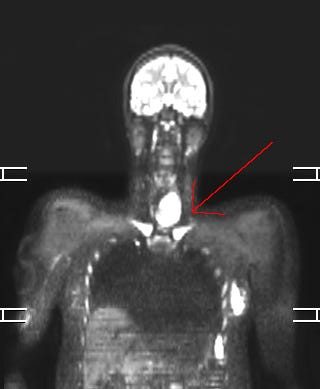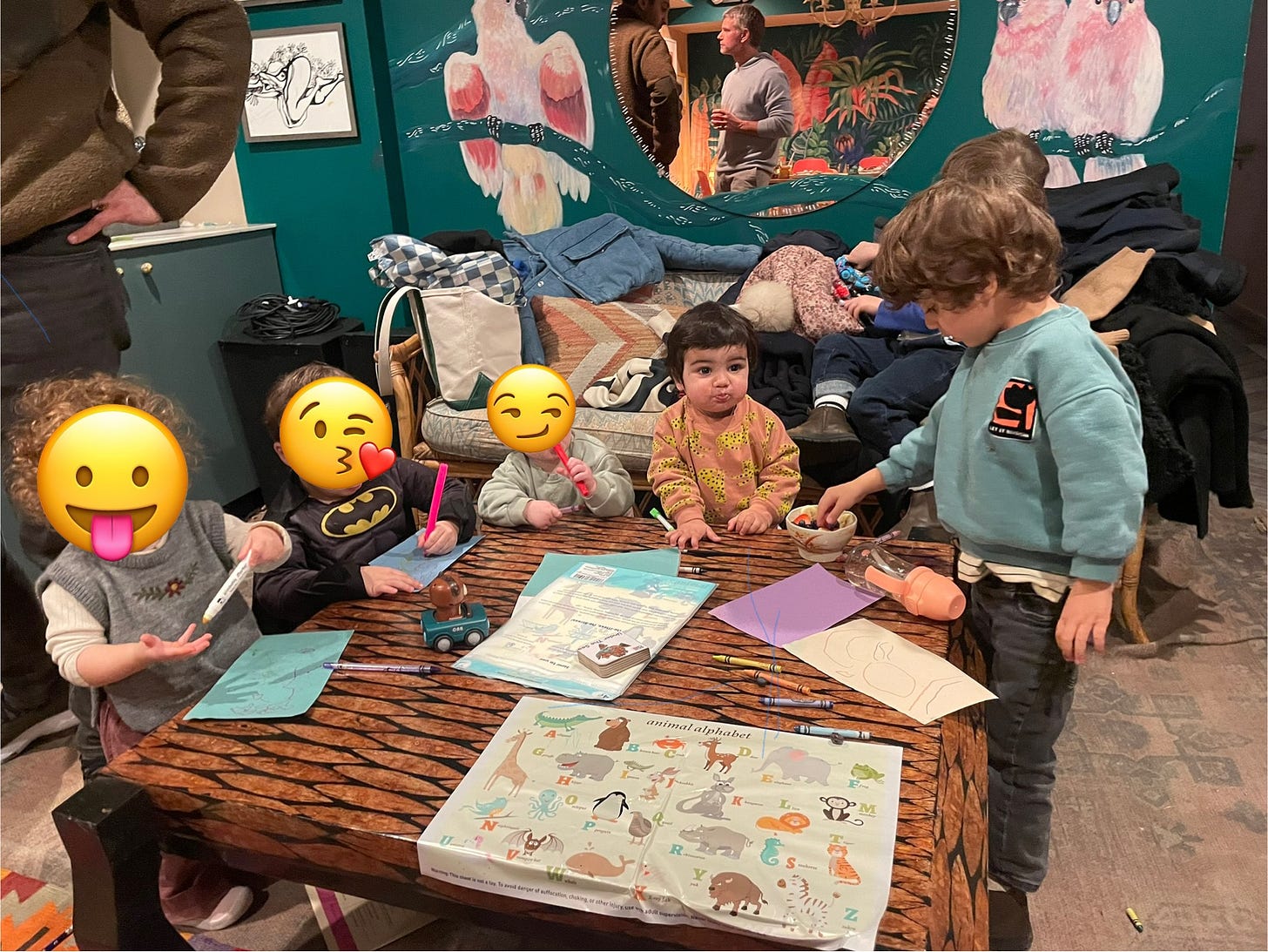Becoming woo
Finding a tumor in my neck, the role of Dr. Google, and reclaiming my bathroom from my kids.
Welcome to “A Little Woo,” where I’ll be exploring why the medical establishment is losing smart patients, how to advocate for ourselves without losing our minds, and what happens when startup thinking collides with healthcare bureaucracy. Plus, you'll get honest takes on parenting, startups, wellness, and finding your way when the usual playbook isn't working, from a multiple-time startup exec mom who loves science…with a side of woo. Follow along, subscribe, or send to your friends!
How I became a little woo
When I was in high school in Santa Fe, I struggled with acne and irregular periods. My mom took me to a dermatologist who prescribed me various creams and antibiotics that only seemed to make things worse. I asked my doctor if dairy and sugar could be making my skin worse, and she told me there is no connection between diet and skin. “You think everyone who eats ice cream gets acne?”
When I was just out of college, living in San Francisco, I had an irregular pap smear that wasn’t resolving. The doctor wanted to do a “LEEP procedure,” which carries a (low) risk of future labor complications, and I asked if there were any alternative options. I shared that online I had read about a “DIM” supplement, which contains a derivative of broccoli, helping people clear it. I asked her what she thought. She laughed at me and said “if you think that works, why not just eat broccoli?”
When I was recently married in Brooklyn, I had a “missed miscarriage,” where the fetus had died but is still in your body. Since it was peak Covid, and D&Cs were considered “elective” procedures, my doctor told me I’d just have to wait for it to pass naturally. Luckily I had an OBGYN friend who told me the abortion pill was also an option. I later found out that my doctor's practice didn't use the abortion pill because of their historical religious affiliations. This wasn't just about medical choices – it was about how institutional beliefs were silently shaping my options without my knowledge. How many other decisions were we making without full understanding of our options?
When I had just stopped breastfeeding my second baby, I told my PCP that something felt “off” in my upper chest, but I wasn’t sure what it was. I asked her if I should consider a full body MRI, or expanded bloodwork. She told me that as a never smoker with a normal BMI, I’m “just not the profile” of someone they worry about. My regular bloodwork said I was in “perfect health.” All this extra information would just be noise.
I got the full body MRI anyway a month later, in October of 2024, and they found a 6 cm tumor in my neck. That’s just a little smaller than a tennis ball. Sometimes being "difficult" or "paranoid" means being your own best advocate.

The Dr. Google dilemma
I became “a little woo” from being frequently either dismissed or given unsatisfactory answers in the doctor’s office, and while I used to feel like I was in the minority — someone who respects science but is critical of Western medicine and the standard of care — I believe this middle ground is where a lot of us are heading. The rise of RFK Jr. makes this particularly timely. His critiques of pharmaceutical industry influence, environmental toxins, and corporate corruption in healthcare resonate with many of us who've felt failed by the medical system. Yet he also promotes dangerous conspiracy theories about vaccines and Covid. For those of us who are politically liberal but somewhere on the "woo" scale, his rise forces us to think carefully about where we draw our lines. We're learning to parse which alternative ideas are worth exploring, versus which ones are scientifically unfounded or dangerous. It's possible to be critical of our healthcare system's shortcomings while still embracing evidence-based medicine.
Having acne in my teens and 20s became my first crash course in medical advocacy. I spent hours reading medical journals and forums, learning about hormones and inflammation, trying to understand why my skin was rebelling. The question kept nagging: Why didn't my doctors care about the root cause? So I did what most of us do when we don’t know where to find answers – I took to the internet and the infamous “Dr. Google.” I read about PCOS, insulin resistance, food sensitivities, histamine intolerance, elimination diets, stress and cortisol, so many supplements – it was a rabbit hole.
There is a smugness you hear from many highly educated people about using the internet for health concerns. Don’t confuse your Google search with my medical degree. It's the battle cry of frustrated doctors everywhere. And they're not wrong to roll their eyes. But here's why the smugness is misplaced: when I pull up Google at 2 AM, I'm not trying to replace their expertise – I'm trying to speak their language. Every hour I spend reading medical journals and case studies is an attempt to bridge the gap between what I'm experiencing and what they're ready to engage with. It's not about playing doctor; it's about becoming fluent enough in medical-speak to advocate for ourselves in a system that often mistakes silence for consent. It is an indictment on the relationship between doctors and patients, and an indictment on the way medical decisions are made today.
Highlights of the week
“Parallel Parenting”: In the almost 4 years since I became a mom, I’ve struggled to make mom friends I really connect with in a casual like-family way in my neighborhood — the kind you can have over without cleaning your house. Well I feel like I finally reached the next level in the video game, when a group of us spontaneously took over a private room in a local restaurant, brought toys, children, and husbands, and ate brunch while our kids played, screamed, laughed, ate pancakes, and took turns trying to escape from the room. Doing chaos together is better than doing it alone!
There’s a crossing guard I see multiple times a week who is so damn earnestly friendly to everyone that it legitimately snaps me out of the heads-down-no-eye-contact rush I’m in every time. Well, today it was his birthday and he had a huge pile of presents and an assortment of random helium balloons that people had given him, and everyone was wishing him a happy birthday as they crossed. I found myself feeling weepy and overwhelmed that amidst the current chaos of the world, this man was still getting celebrated by near-strangers. It was a reminder of how you can earn trust and connection by showing up, being human, and showing small moments of genuine care.
The only bathtub in our house is in the en-suite bathroom for my bedroom, which means that my bathroom has become a kid zone in a way that I accepted but also has grated on me in a micro way each time I use it. Well I am pleased to announce I have reclaimed my bathroom (!!) with a couple key purchases: a wall mounted bath toy organizer that you can detach and scoop toys out of the bath with, a memory foam bath mat that can double as knee support when you’re wrestling wet toddlers, a minimalist non-garish rinse cup (which they like just as much as the moldy whale one I just tossed), and wash cloth mitts I can hang on suction wall hooks. Guys, sometimes it’s the little things.
In my next post, I’ll share my journey of diagnosing my tumor, and the path I took to learn about my full scope of options.
This journey toward becoming “a little woo” isn't about rejecting modern medicine or embracing every alternative theory that comes along. It's about finding that sweet spot where science meets lived experience, where data meets intuition, and where being informed doesn't make you difficult. If you're walking this line too – questioning but not rejecting, seeking but not settling – welcome! I’d love to hear your stories! We have a lot to figure out together.





Hi Jo! Hope the tumor is benign and treatable! Yikes! I'm glad to read of your advocacy efforts, and they are so so important. For a balanced perspective, I would also recommend reading "Overdiagnosed: Making People Sick in the Pursuit of Health" By Dr. Gil Welch. It's a difficult balance to strike, but important to keep both perspectives in mind.
Thank you for sharing and always having the conversations that need to be had! Will definitely be following along on this journey with you ❤️